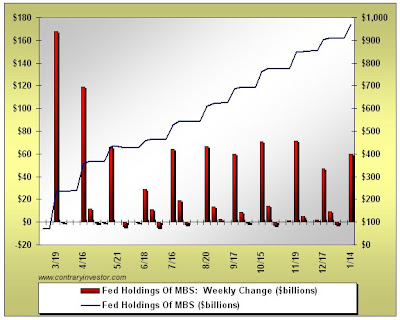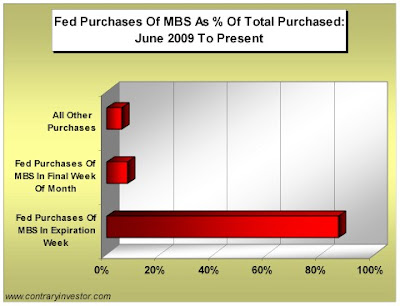Several readers were kind enough to write in with more material about this correlation as noted in the ContraryInvestor as I had requested.
If the Fed is buying in the TBA portion of the MBS, it is clear that this is a cross-correlation, since both this market and option expiration have similar dates.
Friend Lee Adler over at the Wall Street Examiner has also been tracking this and notes:
"Jesse (whose work I greatly respect or I wouldn't feature it) is wrong on this count in my view, but correct in that the MBS purchases do have an impact on stocks, as does any liquidity pumping. But that impact is far less than the direct impact of open market operations directly with the Primary Dealers, as was the case in the direct Treasury purchases, and the GSE purchases. When the MBS liquidity is withdrawn it will have an impact, but mostly on the Treasury market. The impact on stocks will be secondary, and not pretty, I might add."He specializes in this area, and his analysis seems to be 'spot on.' But I have to add to this that Jesse is not the Contrary Investor, although I would be glad to be the author of his databases and excellent analysis on the markets, on the whole, week in and week out. And I often rely on information and perspectives from a variety of connoisseurs of financial data, who add immeasurably to the daily fare here.
Here is what JESSE said.
"The data is intriguing to say the least. As you may recall, option expiration in the US stock indices occurs on the third Friday of every month. We have pointed out in the past that this monthly event is often the occasion of some not so subtle racketeering by the funds and prop trading desks of the banks in separating the option players from their positions, and pushing prices around to maximize the pain.And here is my addendum from today.
Why would the Fed wish to provide extra liquidity, to the tune of $60 billion or so, for the banks during that week? There must surely be other ways to support the equity markets. Such as buying the SP futures in the thinly traded overnight session. I am not aware of a strong correlation for stock selloffs or extraordinary weakness in option expiry weeks per se.
It might not be a coincidence, but there could be some unrelated event in the mortgage markets that also occurs on the third Friday or Thursday of each month. We are not aware of it, but that does not mean it does not exist. They might also be making the purchases more randomly, but reporting them on some schedule as the Fed does its H.41 reports, for example. Anyone who might know of such a cross correlation would be kind to let us know of it."
Addendum 22 Jan: Several readers have written to suggest that the Fed is buyingI was intrigued but skeptical of the meaning of this correlation, confessed my lack of specific knowledge, AND suggested an unrelated cross-correlation, with a request for input from readers. It was just too obvious and did not seem to have a point. Option expiry is a week of back and forth manipulation and not a substantial ramp. It also goes against my basic model that the Fed minds the bond market, and the Treasury, as head of the Working Group on Markets and the Exchange Stabilization Fund, keeps it eye on stocks via the SP futures. And a defendant will have gone to prison on weaker circumstantial evidence than that which supports the case for central bank manipulation in the precious metals markets.
in the TBA markets, new issues, and that they have fixed settlement dates that
roughly coincide with stock options expiration. That does not remove the
potential material effect of providing liquidity in options expiry week, but it
certainly does nullify the imputation of deliberation. I think the front running
as noted in the blog today in Treasuries is more obvious and plausible."
"Jesse" is often on the edge in his inquiry, and asks a lot of questions, reads lots of material, but always seeks the data, and cuts it with a skeptical eye. That is the method of preparation in Le Cafe.
Related, here is some additional information on how MBS Analysts Watch the Fed's Every Trade.
I think the real question does remain, "What happens when the Fed stops buying?" and of course, "Is someone front running the Fed's purchase in the Treasury markets (and perhaps MBS for that matter)?"
Audit the Fed, and we will know much more.

































